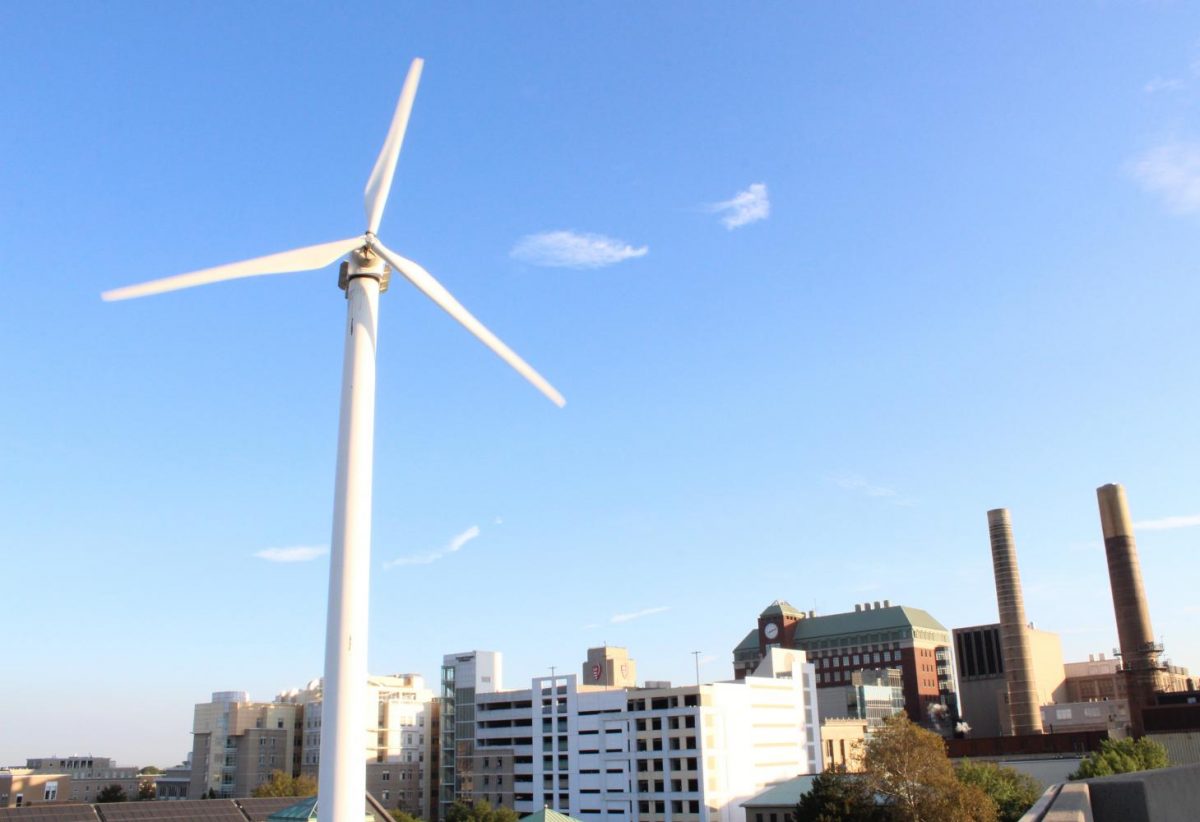Salm: DOE grant provides support for sustainability research
Case Western Reserve University’s famous wind turbine helps power the Veale Center. The turbine was one of the first steps of many toward a more sustainable campus.
As Americans, we live in a capitalist economy where a majority of our interactions with the world are dependent on or are dictated by money. Regardless of progressive intents, a lack of funding can halt research or developmental projects. As a result, one of the greatest hurdles in initiating research, applying research to usable models and implementing novel technologies into society is solidifying adequate funding for all of these processes.
Luckily, this hasn’t been a problem for Case Western Reserve University. Recently, the Department of Energy (DOE) granted CWRU $600,000 to develop new economic approaches to increase the implementation of green energy, as the DOE attempts to reduce the existing financial hurdles. With the impending catastrophes induced by global warming and the depletion of natural resources, cost-effective sustainable energy is imperative in attempting to avoid the projected increase in atmospheric temperature and the resulting destruction of our environment.
Since implementing sustainable energy technologies requires the investment of intimidatingly large sums, a new capital model needs to be developed. Within the bounds of the current economic model, known as the one-size-fits-all venture capital model, most private or smaller companies cannot afford to risk investing required funds for the needed duration to effectively implement green technology.
Typically, under the one-size-fits-all model, investors dedicate a maximum of seven to 10 years to starting up a company, but once these 10 years have passed—with little resulting profit—investors back out. Unfortunately, most sustainable energy start-ups require more than ten years to acquire a profit. And since some offices within the federal government offer little to no monetary incentive or support for investing in sustainable energy, an alternative capital model must be developed to encourage companies that are attempting to work toward a greener future.
With this DOE grant, CWRU intends to develop an innovative capital model that allows for reasonable investment throughout the necessary lengthier, and therefore riskier, duration without threatening investors’ returns and payout obligations.
CWRU’s research, performed within the Weatherhead School of Business, is a part of a larger project under the Technology-to-Market Program within the DOE’s Office of Energy Efficiency and Renewable Energy. This project supports the exploration of a multitude of different aspects from the economic portion of sustainable energy technology implementation. Of a $7.8 million budget allotted to this project, CWRU is the only university, alongside six corporations, performing research for the Innovative Pathways project.
The DOE’s initiation of this project is imperative in our current economic climate since there is a relatively loud and brash desire to maintain or potentially increase fossil fuel production in the United States. Many of the calls for an increase in the use of nonrenewable resources and harmful extraction of these resources have stemmed from the desire for greater capital gain. Thus, the remodelling of the one-size-fits-all economic format allows sustainable energy technologies to exist as equally attractive methods of energy production in terms of monetary gain.
Additionally, the uncertainty of the involvement of the U.S. in the Paris Climate Accord and the appeal of newfound fossil fuels buried beneath the melting Arctic ice caps are increasing companies’ desires to produce energy using fossil fuels and are decreasing the appeal of green energy. Since sustainable energy infrastructure is expensive and requires many years to develop while fossil fuels are more immediately convenient for the producer and are becoming more available, CWRU’s research on a sustainable and cost-effective model for implementing green technology proves imperative to the progression of American, environmentally-friendly energy.
Ultimately, sustainable energy technology requires greater investor monetary obligations, so many smaller companies have difficulties supporting green energy. With the research performed under the Innovative Pathways program, CWRU and other members of the initiative have the opportunity to explore economic models that are more conducive to supporting the implementation of sustainable energy.
Maeve Salm is a first-year student. She is currently undecided about her major.



